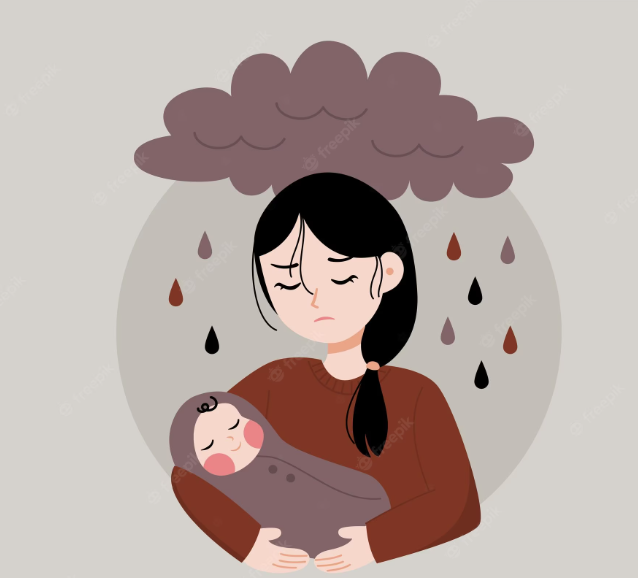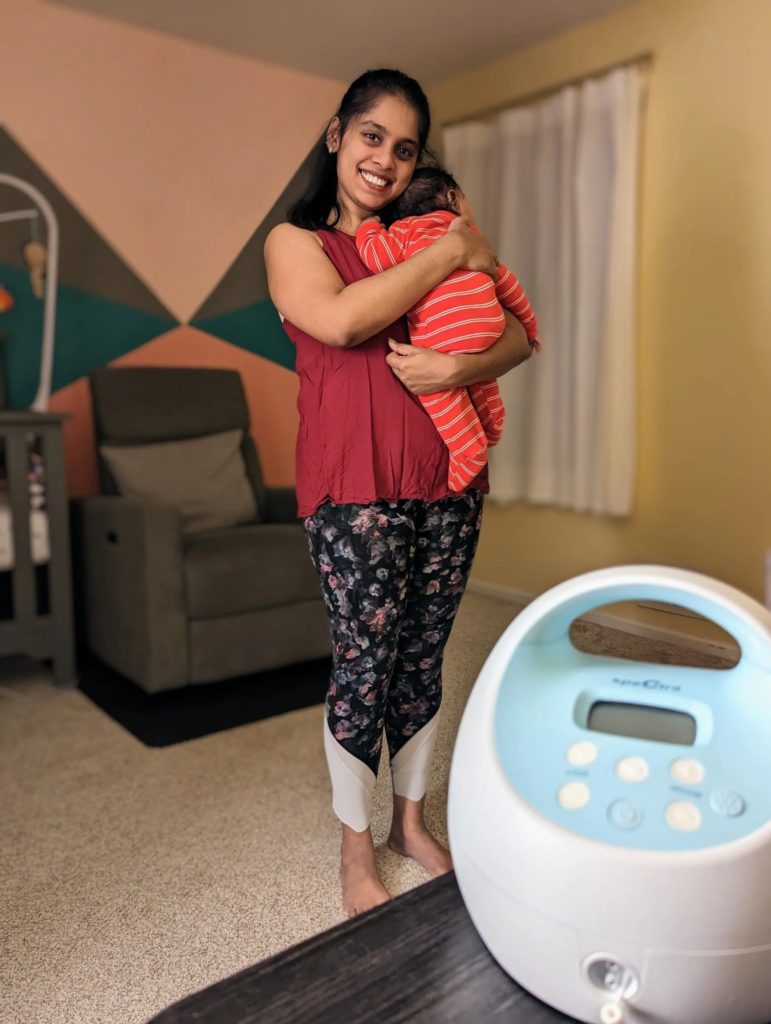“Do you experience feeling sad or down lately?” – was a familiar question at any doctor’s office for the first few weeks after birth. However, at 2 months postpartum (pp), when I was asked this question at my pediatrician’s office, it didn’t feel like rhetoric. I wanted to say YES. I was apprehensive, and reluctant, withdrew, and said NO.
Postpartum depression is real.
I had a slightly traumatic birth experience, and recovery was hard. I had an epidural administered twice, pushed for 6 hours, however, the epidural was discontinued during birth – lightly put, this was just the beginning. I am not going to go into the gloomy details of it, nor do I want to want to relive it, because, at the end of it, I had a beautiful baby boy.
The reason for PPD is never fully understood. Some say it could be hormones, some say it could be a past trauma, and some completely dismiss it. Nonetheless, I am not trying to make a case for or speculate if PPD is real, and neither am I going to describe the gory details of my labor. Instead, I want to focus on how to empower oneself if faced with this situation.
Like how every pregnancy is unique or every child is unique, so is every woman’s postpartum and recovery. Each woman’s experience is different, her healing and her recovery strategy. Instead of this post being a singular experience, I reached out to a few moms to share their experiences. The question asked was “Did you experience postpartum depression? If yes, how did you overcome it?”.
I am not an expert in this field, but hey! Here are my 2 cents to support any new mom.
Educate yourself
In combating PPD educating oneself on the difference between baby blue and depression is critical. During pregnancy, I discussed with my husband the possible sadness and mood swings that I might experience during postpartum and how he can support me. I asked him to avoid dismissive language like “Calm down” or “try to relax” when I was already agitated. This preparation can lead to a more supportive and aware environment.
I had the slightest form of PPD. However I was able to overcome it quickly. After the baby is born, hormones can be all over the place for new moms. I found myself constantly crying for no reason. I was aware of PPD and signs and symptoms. I had a discussion with my family members and told them how I was feeling. My grandmother who can be staying with me during that time took a great effort to make sure I was feeling ok. She supported me all ways – breastfeeding, taking care of the baby, cooking yummy and healthy food. She insisted that I pump and bottle feed so that I can get some rest. For me, the feeling of prioritizing new mom along with the baby helped me get over it quickly. This couldn’t have been possible without supportive family members.
– New Mom 1
Take care of yourself
As a new mother, it’s essential to prioritize self-care during the postpartum period. The stress of caring for a newborn can quickly take a toll on your mental and physical health. But it’s crucial to remember that taking care of yourself is not selfish, it’s necessary. It’s a way to refill your cup, so you can be the best version of yourself for your baby.
Whether it’s a simple cup of coffee, a trip to the nail salon, or a night out with friends, these small moments of self-care can have a big impact on your overall well-being. I made an effort to schedule in some “ME time,” even if it meant coordinating with family or friends to help with the baby.
Remember, you’re not just a mom, you’re also a person with your own needs and desires. Your family and loved ones want you to be happy and healthy, so don’t be afraid to reach out for support. Taking care of yourself will ultimately benefit everyone around you.
I started going out for day trips and vacations to overcome it.
– New Mom 2
Lean on your village
The pressure of caring for a newborn, coupled with physical limitations during postpartum, can take a heavy toll on a mother’s mental health. I found myself in this situation, as I wanted to help my mother who was tirelessly doing all the work, but I was struggling with my own limitations and physical changes. The self-inflicted pressure to keep up with my pre-baby pace added to my stress and eventually led to postpartum depression.
However, I soon realized that I was healing, and my body was not letting me down, but rather it was trying to recover from childbirth. This is when my baby sister stepped in to help. Her presence was a true blessing and an all-hands-on-deck situation. The added support was nothing short of a miracle and showcased the importance of having family by your side during this challenging time.
At 2 months, my father even flew from India because I wanted him by my side. This emotional support helped me so much during this difficult time.
If you’re going through postpartum depression, don’t hesitate to reach out to your family for help and support. They can be an invaluable source of comfort and strength during this time, and having them by your side can make all the difference in your journey towards recovery.
I was never shamed by my family for not being able to breastfeed. My husband was a constant support.
– New Mom 3
Seek help
The cry of a 2-week-old baby, echoing through the night for hours on end, is a distress that no new parent should have to bear. For many months, my family and I struggled with the unrelenting colic of our own baby. We sought answers from our pediatrician, tried countless remedies, and were determined to ease our little one’s discomfort. Despite our best efforts, the colic persisted.
The witching hour, as we called it, was a source of anxiety and dread for me. I felt helpless and overwhelmed as I watched my baby suffer. But amidst the darkness, a glimmer of hope appeared. We discovered that our baby seemed to be slightly more at peace when in the care of my mother. So, as the hour approached each night, she would lovingly hold and comfort our baby while I stepped away to gather my strength.
This simple act of love and support brought healing to all of us. It was a reminder that, in the face of postpartum depression, there is always hope. With the support of those around us, we can weather even the darkest of nights and find peace for ourselves and our children.

Kill the mom guilt
When speaking to new mothers, a common source of postpartum depression (PPD), sadness, and anxiety is related to breastfeeding. Arising from various reasons such as difficulties with breastfeeding, inadequate milk supply or simply an overwhelming pressure to breastfeed can leave mothers feeling helpless. Watching a crying baby, especially if it’s due to hunger, can be heartbreaking and can take a significant toll on a mother’s mental health and lead to PPD.
It is important to remember that, above all, the well-being of the baby is the most important thing. Adopting the mantra “fed is best” can help relieve the stress and guilt that mothers may feel about their breastfeeding experiences. Additionally, finding a local donor milk source through hospitals or pediatricians can provide additional support. Whether it is through breastfeeding, formula feeding, or a combination of both, the goal is to provide the baby with the nutrition they need to grow and thrive.
Did you know?
A good faith community called zipmilk.org is a wonderful place to find lactation consultants, support counselors, medical professionals in your zip code.
Show up well, husbands
The birth of a baby can be an incredibly exciting moment, filled with wonder and joy as the tiny person seen on the sonogram and heard through the heartbeat finally becomes a real, chunky reality. However, this time can also bring stress, disorientation, and overwhelm to couples. That’s why it’s important for birthing partners to be present and supportive during the postpartum phase. Your family’s memories of this period will be shaped by the support you provide, the kind words you use, and your constant presence. Your understanding and acceptance of mood changes and your continued interest in their well-being will help your family navigate this challenging phase with love and connection.
My husband was a true supporter. Took up all the chores pertaining to caring for the baby. He would stay awake all night so that I could get a few hours of sleep. He never pressured me to do anything, instead he encouraged self-care and focused on my health and recovery. He truly made a difference in our postpartum journey.
I spoke to my husband about it and sought therapy. We also started doing couples therapy.
– New Mom 4
Seek professional help
As a new mother, I struggled with postpartum depression and felt like I was constantly struggling to keep my head above water. I knew I needed help, but the thought of seeking therapy was daunting.
Like many, I felt like there was a stigma around seeking professional help for my mental health. I felt like I should be able to handle it on my own, that seeking help was a sign of weakness. But I soon realized that this couldn’t be further from the truth. Just like when I go to the doctor when I have a physical illness, I needed to reach out for help when I was struggling with my mental health.
Attending a support group (Postpartum support international) I was able to connect with other women who were going through the same thing, and it helped me see that I was not alone.
Seeking therapy was a critical next step. It was indeed a challenging journey, but one that ultimately led to my healing and recovery.
Did you know?
Many employers offer EAP (Employee assistance program) as part of their benefits where you can get a few free sessions with a licensed Therapist/counselor.
Writing about Postpartum depression has been a difficult and emotional journey, but it is important to bring attention to this issue and provide support for those who may be struggling.
By sharing our experiences and providing a platform for open and honest conversation, we can help break the stigma surrounding PPD and ensure that those who are suffering are not alone. It is time for us to come together as a community and support one another in our journey towards healing and recovery.
Don’t let pride or shame hold you back from taking care of yourself and seeking the help you deserve.
So, let’s start the conversation, let’s reach out, and let’s provide the love and support that is so desperately needed.



